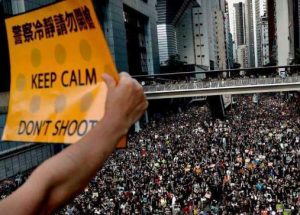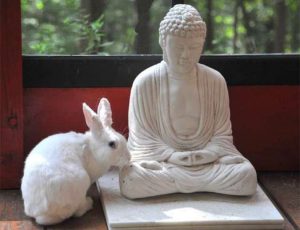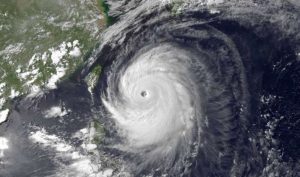
Over the past four years, I’ve taken part in more formal compassionate action than ever before: I carried out a year-long daily vigil in my local town; I was involved in organizing many interfaith and Buddhist actions; and I was arrested several times as a result of non-violet direct action.
This kind of activism is one possible expression of our desire to make a difference, but I hope that the lessons I’ve learned will apply to whatever compassionate action you are already taking or hoping to take in the world. I would include many things on this list: raising children; volunteering for a food bank; making art; giving to charity; making soup for a sick friend; bringing Buddhist values to our workplace; doing formal chaplaincy; smiling at a stranger in the supermarket queue . . .
One of the aims of practicing Buddhism is that we become more kind. What does this look like in practice? What should it look like? How can we balance our desire to effect change with the responsibilities of our ordinary lives? Here are a few of the things that I’ve learned.
1. Small actions can make a big difference
When faced with the enormity of the crises we are currently facing, it’s tempting to fall into hopelessness, despair, and inactivity. This is a shame for two reasons. The first is that it doesn’t make us feel good to do nothing. The second is that the world misses out on our small compassionate acts. I am reminded of a time during a silent retreat when I noticed a colleague stretching toward an out-of-reach jug of water. I picked it up and passed it to them without thinking. At the end of the retreat they spoke about how moved they were by this. They didn’t see themselves as someone who was worthy of care and they were able to receive this tiny action as proof of my valuing them. We never know what ripples our small compassionate actions will have.

2. Different people are called to different actions
Over the past few years, I’ve spent quite a long time comparing myself with those in my peer group who dedicate more of their lives to eco-activism. It has taken me a long time to realize that different people are called to do different things. I could follow in the footsteps of those friends who have gone to prison for their beliefs, but I am also already running a Buddhist temple, and this is something that I am in a relatively unique position to do. This is my work, and more extreme activism is theirs. We all need to find our own way with our compassionate action. Do we want to put our spare energy into making music? Or strengthening relationships? Or tending gardens? Maybe we don’t have any spare energy at the moment, or are running at a deficit, and so our compassionate action is to be kinder and more forgiving toward ourselves, or to simply keep our head above water as best we can during a difficult season of our lives. This “tuning in” to what we should be doing is ongoing as we and the world continue to change over time.
3. Compassionate action is a practice
It can be dispiriting, to say the least, when we work hard at something that is important to us and then witness it having apparently no effect on the world. It has been helpful for me to see my compassionate action as sufficient in itself—just as we might see our Buddhist practice. We make offerings because it’s a good thing to do, not because we need guaranteed results or because we are seeking praise or any other personal benefit. It’s important to hold onto our discernment. Sometimes we may decide to withdraw our energy from a moribund project and reinvest it elsewhere, but it’s also important to keep an open mind about the long-term or the hidden effects of our actions. Who knows when a tipping point will be reached and a big shift will happen? In the meantime, we should keep making offerings!
4. The most sustainable compassionate action is a side-effect
My experience is that when something is a stretch for me to do, I’m unlikely to keep it up. This doesn’t mean that we should only do things that don’t require any effort. It takes a lot of energy for me to write and I’ve been doing it for decades—and I am glad to be doing it. We’re more likely to feel this stretch when we are taking actions that are not quite in alignment with our calling or our capabilities, or when we are consistently making offerings despite being low on energy or resources. I find that my most sustainable actions are almost a by-product of looking after myself and following the Dharma, like passing my colleague the water jug. I bake for my friend because she’s going through a rough time and I want to give her something nice, or I give money to a charity because I just feel grateful to them for what they do. At their best, we make offerings without even seeing them as offerings.
5. The Buddha has our back
My Buddhist practice has helped me to act compassionately in various ways. My faith has steadied me during some of my scarier acts of non-violent disobedience, and it has brought me together with other activists of faith. It has reminded me of the bigger picture—the epic measurements of Buddhist time remind me that we are only here for a very short while, and that we know very little about the mysteries of the universe. I have listened to the Buddha as a way of discerning the right action for me—taking my questions to meditation, and asking the Buddha for advice. I also appreciate the Pure Land teaching that I am merely a fallible human being, and that it is impossible for me to know for sure whether or not I am really helping. All I can do is take refuge in the Buddha, allow their compassion and acceptance to surround me, and do the best I can with what I’ve got. Finally, it is a consolation to remember that we can’t take permanent refuge in this world—regardless of how hard we work to make positive changes. We are only visitors here. Constrained by our limitations as we are, we can treat the world and other living beings as kindly as we can in the time we have. This is enough.
It has been an immense privilege to be involved in activism over the past few years. I have learned so much about myself, other people, and the world. I have been immersed in a beautiful community of people who care passionately about our planet. I have found reserves of courage that I didn’t know I had, and alongside the climate grief and rage I have experienced much calm, satisfaction, and joy. As I take a break from that world and focus my energy on my writing and on our Buddhist community, I hope that I can bring the lessons I’ve learned into everything that I offer. We are all taking compassionate action, all of the time. With the Buddha’s help, we are changing the world.
Related features from BDG
Compassion and Connection: Jungto Society Hosts Study Trip for Young Leaders and Activists from the International Network of Engaged Buddhists
Activism and Action on the Path of Engaged Buddhism
Buddhist Voices in the Climate Crisis: Earth Words and Watershed Activism
Not knowing, Bearing Witness, and Compassionate Action
Activism Is Dharma
For the Earth: Buddhist Environmental Thought and Activism











